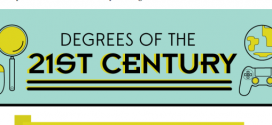By: Peter Stokes and Sean Gallagher
A little over 12 months ago, The New York Times famously dubbed 2012 “The Year of the MOOC.” What a difference 365 little days can make. Here at the back end of another calendar year, we wonder if 2013 might come to be thought of as “The Year of the Backlash” within the online higher education community.
Even Udacity’s founder, Sebastian Thrun, one of the entrepreneurs whose businesses kicked off MOOC mania, seems to be getting into the backlash game.
According to Fast Company magazine, Thrun recently made the following observation regarding the evanescent hype surrounding MOOCs and his own company: “We were on the front pages of newspapers and magazines, and at the same time, I was realizing, we don’t educate people as others wished, or as I wished. We have a lousy product.”
Of course, the hype around this category hasn’t wholly abated. Coursera has just announced another $20 million infusion of venture capital. And MIT has just released a report embracing the disaggregation of the higher education value chain fomented by platforms such as edX.
But maybe Thrun is right. Maybe MOOCs are a lousy product – at least as initially conceived. And even if MOOCs are meaningfully reimagined, the mark they have made on the public consciousness to date could have lasting repercussions for the broader field of online learning.
It seems like only last year (in fact it was) that some were crediting elite institutions with “legitimizing” online learning through their experimentation with MOOCs. But what if instead of legitimizing online learning, MOOCs actually delegitimized it?
Perhaps this is why, currently, 56 percent of employers say they prefer an applicant with a traditional degree from an average college to one with an online degree from a top institution, according to a Public Agenda survey undertaken earlier this year.
We’ve been following online learning for a long time, and collectively share experiences in teaching online, earning credentials online, writing about online learning, analyzing the online learning market, and serving as administrators inside a research university with a significant stake in online and hybrid delivery models.
While some MOOC enthusiasts might like you to believe that online learning appeared out of nowhere, sui generis, in 2012, the reality is that we’ve been bringing courses and degree programs online for more than 20 years. Hardly born yesterday, online learning has evolved slowly and steadily, taking these two decades to reach the approximately one-third of all higher education students who have taken at least one online course, and serving as the preferred medium of delivery for roughly one-sixth of all students. The pace of adoption of online learning – among institutions, students, faculty, and employers – has been remarkably steady.
The advent of this so-called “lousy product” – the MOOC – may be triggering a change, however. Indeed, recent survey evidence suggests that the acceptance of online learning among certain constituencies may be plateauing. Is it possible that a backlash against MOOCs could even precipitate a decline in the broader acceptance of online learning?
The long-running Babson Survey Research Group/Sloan-C surveys show relatively little change in faculty acceptance of online instruction between 2002, when they first measured it, and the most recent survey data available, from 2011. The percentage of chief academic officers that indicated they agreed with the statement “faculty at my school accept the value and legitimacy of online education” only grew from 28 percent in 2002, to 31 percent in 2009, and 32 percent in 2011. According to a more recent Inside Higher Ed/Gallup survey, “only one in five [faculty agree] that online courses can achieve learning outcomes equivalent to those of in-person courses.”
We have to be careful making comparisons across surveys, audiences and time spans, of course. But there is a palpable sense here that something may have shifted for online learning in the last year or so, and that as a result of that shift, online learning may be in danger — for the first time in some 20 years — of losing momentum.
In recent months, we’ve witnessed faculty rebelling against online learning initiatives at institutions as diverse as Harvard, Duke, Rutgers, and San Jose State, to name a few. In the latter case, faculty rallied to resist the use of Udacity courses on campus, but other instances of resistance did not even pertain to MOOCs – such as Duke’s decision to withdraw from the 2U-sponsored Semester Online consortium, or the vote from Rutgers’ Graduate School faculty to block the university’s planned rollout of online degree programs through its partnership with Pearson.
Our hypothesis is that MOOCs are playing a role here – chiefly by confusing higher education stakeholders about what online learning really is. By and large, of course, online learning isn’t massive and it isn’t open. And by and large, it does actually involve real courses, genuine coursework and assessment, meaningful faculty interaction, and the awarding of credentials – namely, degrees.
In numerous focus groups and surveys we have conducted over the course of 2013, both prospective students and employers have raised concerns about online learning that we had not been hearing in years past – concerns that have been chiefly related to the level of faculty interaction with students, the relationship between quality and price, and the utility of courses that don’t lead to recognized credentials.
The net contribution of the MOOC phenomenon, for the moment at least, may be a backsliding in the general acceptance of online learning – not least among faculty, who may fear they have the most to lose from MOOC mania, especially in the wake of controversial legislative proposals in a variety of states mandating that MOOCs be deemed creditworthy, thereby threatening further public divestment in higher education.
For those of us that have nurtured the growth and strengthening of online learning over many years, this would be an unfortunate outcome of the MOOC moment.
If there is a backlash under way, and if that backlash is contributing to an erosion in the confidence in the quality of online learning generally, that is something that won’t be overcome in a single hype cycle – it will take time, just as the establishment of degree-bearing online learning programs took time to develop and bolster. Possibly even more than one year.
Note: This article first appeared on Inside Higher Ed. Peter Stokes is vice president of global strategy and business development at Northeastern University, and columnist at Inside Higher Ed. Sean Gallagher is chief strategy officer at Northeastern University.





2 comments
Pingback: 365 Days Later, “Year of the MOOC” Becomes “Year of the Backlash” | EduWire.com
Pingback: 365 Days Later, "Year of the MOOC" Be...